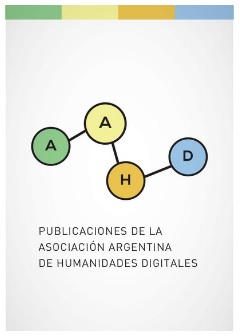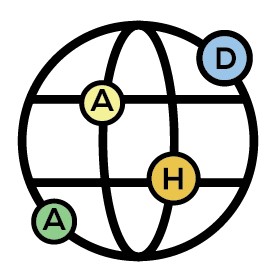The Big Reset of Knowledge and its Impact on Digital Humanities
DOI:
https://doi.org/10.24215/27187470e034Keywords:
GAFAM, Privacy, Big data, Digital Humanities, Geopolitics of knowledgeAbstract
This article describes the impact of GAFAM (Google, Apple, Facebook, Amazon and Microsoft) on public education and, in general, analyzes the paradigm shift in the production of and access to digital knowledge. The COVID-19 pandemic favored the expansion of global oligopolies and the plataformization of processes and services: media, education, health, transport, food, etc. These phenomena generate important cultural homogenization effects and therefore constitute a threat to biocultural diversity and an obstacle to technological innovation. In this scenario it is necessary for the Digital Humanities to revive their critical role and combine its original hermeneutic and epistemological impulse with political awareness. In other words, it is time for DH to start defending and strengthening the cultural, linguistic and epistemic variation in the digital dimension.
Downloads
References
Brown, L. X. Z. (16 de noviembre de 2020). How Automated Test Proctoring Software Discriminates Against Disabled Students. Center for Democracy and Technology. https://cdt.org/insights/how-automated-test-proctoring-software-discriminates-against-disabled-students/
Buiatti, M. (2004). Il benevolo disordine della vita. UTET.
Chan, L., Okune, A., Hillyer, R. Albornoz, A, & Posada, A. (2019). Contextualizing Openness: Situating Open Science. University of Ottawa Press. https://ruor.uottawa.ca/handle/10393/39849
Escobar, A. (2014). Sentipensar con la tierra. Nuevas lecturas sobre desarrollo, territorio y diferencia. Ediciones UNAULA. http://www.aibr.org/antropologia/netesp/numeros/1101/110102.pdf
Fiormonte, D. (2017). Digital Humanities and the Geopolitics of Knowledge. Digital Studies/le Champ Numérique, 7(1). DOI: http://doi.org/10.16995/dscn.274
Fiormonte, D. (2018). Per una critica del testo digitale. Letteratura, filologia e rete. Bulzoni.
Fiormonte, D., & Rio Riande, G. del (2022). The Peripheries and Epistemic Margins of Digital Humanities. In O’Sullivan, J. (ed.), The Bloomsbury Handbook to the Digital Humanities (pp. 17-26). Bloomsbury Academic.
Fiormonte, D, & Priego, E. (13 de octubre de 2016). Knowledge Monopolies and Global Academic Publishing. The Toronto School. Then, Now, Next. https://thewinnower.com/papers/4965-knowledge-monopolies-and-global-academic-publishing
Fricker, M. (2007). Epistemic Injustice: Power and the Ethics of Knowing. Oxford University Press.
Gramsci, A. (1997). Socialismo e cultura. Le opere. La prima antologia di tutti gli scritti, ed. A. Santucci. Editori Riuniti.
Innis, H. A. (2008). The Bias of Communication. University of Toronto Press.
Jacob, A. (2021). Punching Holes in the International Busa Machine Narrative. In Kim, D. & Koh, A (eds.), Alternative Historiographies of the Digital Humanities (pp. 121-139). Punctum Books.
Jones, S. E. (2016). The Priest and the Punched Cards. Roberto Busa, S. J., and the Emergence of Humanities Computing. Routledge.
Laird, E., Grant-Chapman, H., Venzke, C., & Quay de la Vallee, H. (3 de agosto de 2022). Report – Hidden Harms: The Misleading Promise of Monitoring Students Online, Center for Democracy and Technology. https://cdt.org/insights/report-hidden-harms-the-misleading-promise-of-monitoring-students-online/
Lawson, Sean (24 de Abril de 2020). Are Schools Forcing Students to Install Spyware that Invades their Privacy as a Result of the Coronavirus Lockdown? Forbes. https://www.forbes.com/sites/seanlawson/2020/04/24/are-schools-forcing-students-to-install-spyware-that-invades-their-privacy-as-a-result-of-the-coronavirus-lockdown/
Maffi, Luisa (ed.) 2001. On biocultural diversity. Linking language, Knowledge and the environment. Washington and London: Smithsonian Institution.
Mirrlees, T, & Alvi, S. (2019). EdTech Inc. Selling, Automating and Globalizing Higher Education in the Digital Age. Routledge.
Pinto, V. (2019). La parte di Tersite. Verità e democrazia dopo la democrazia. Laboratorio dell’ISPF, XVI(9). http://doi.org/10.12862/Lab19PNV
Reiter, B. (ed.) (2018). Constructing the Pluriverse: The Geopolitics of Knowledge. Duke University Press.
Rio Riande, G. del (2022). Digital Humanities and Visible and Invisible Infrastructures. In D. Fiormonte, S. Chaudhuri, & P. Ricaurte (eds.), Global Debates in the Digital Humanities (pp. 247-258). Minnesota University Press.
Sousa Santos, B. de (ed.) (2015). Epistemologies of the South: Justice against Epistemicide. Routledge.
Stiegler, B. (2021). De la démocratie en Pandémie. Santé, recherche, éducation. Gallimard.
Thiong’o, N. w (1993). Moving the Centre: The Struggle for Cultural Freedoms. James Currey.
Vattikonda, N., y Edelson, J. (2020). Big Education is watching you. The Chronicle, October 15, 2020. https://www.dukechronicle.com/article/2020/10/big-education-is-watching-you
Vitali, S., Glattfelder, J. B., y Battiston, S. (2011). The Network of Global Corporate Control. PLoS ONE 6(10). https://doi.org/10.1371/journal.pone.0025995
Yu, J., y Couldry, N. (2020). Education as a domain of natural data extraction: analyzing corporate discourse about educational tracking. Information, Communication & Society, 25(1). https://doi.org/10.1080/1369118X.2020.1764604
Downloads
Published
How to Cite
Issue
Section
License
Copyright (c) 2022 Domenico Fiormonte

This work is licensed under a Creative Commons Attribution-ShareAlike 4.0 International License.
Los autores que publican en esta revista están de acuerdo con los siguientes términos:
- Los artículos publicados en la revista se encuentran disponibles en acceso abierto.
- Los autores conservan los derechos de autor y garantizan a la revista el derecho de ser la primera publicación del trabajo al igual que licenciarlo bajo una Licencia Creative Commons Atribución-CompartirIgual 4.0 Internacional (CC BY-SA 4.0), que permite copiar y redistribuir el material en cualquier medio o formato y remezclar, transformar y construir a partir del material bajo los siguientes términos: debe dar crédito de manera adecuada, brindar un enlace a la licencia, e indicar si se han realizado cambios.
- Los autores pueden depositar el trabajo en un repositorio de preprints, postprints, establecer por separado acuerdos adicionales para la distribución no exclusiva de la versión de la obra publicada en la revista (por ejemplo, situarlo en un repositorio institucional o publicarlo en un libro), con un reconocimiento de su publicación inicial en esta revista.
- Se alienta a los/as autores/as a realizar el depósito de datos en SEDICI, o en cualquier otro repositorio de datos de investigación (como Zenodo, donde la AAHD ha creado un repositorio temático para HUMANIDADES DIGITALES), de manera previa a realizar el envío de la contribución a la revista. De este modo, al remitir el artículo solo se deberá indicar la URL donde se encuentran los datos de investigación.


























